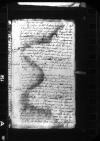Wir sein nicht wenig erfreut, / wie wir von dissemm botenn vorstandenn, / das Ewer Erbarkeit aus gotlichnn gnaden sey in gutter gesuntheit, / die wir Ewer Erbarkeit aus guttemm herczen gonnenn zu langen zceitnn. Hie her von ⌊Konigsberg⌋ und ⌊Braunsberg⌋ wart ein statlich geruchte gebrocht (: Got wold sulchs lange vorhutten :), das Ewer Erbarkeit wer mit tode abgangen, / wor aus uns und den unsernn nicht wenig svermuttigheit zukomenn, / der wegen wir nicht habnn mugen nochlossen, Ewer Erbarkeit mit dissem unsermm frolichemm schreibenn zu besuchenn / und do bey Ewer Erbarkeit vortrawter weis anczeigen, / wie die sache der zceisenn ein gestalt hab. / Uff etlicher hern ⌊diss lands rethenn⌋ thet wir ⌊konigliche majestet⌋ schrifftlich berichten, welcher weis die zceisenn in negst vorgangner ⌊tagfart⌋ zu ⌊Graudencz⌋ geseczt, / nemlich das ... gelt, / aus ursachnn, wie das mol aus gedochter tagfart an konigliche majestet geschribnn, zu ⌊Thornn⌋ solde werden abgelegt, / daruff uns ir konigliche majestet in vorsigeltmm brive geantwurt, / ... wer ir majestet gleich und nicht zu widren, das solch gelt der zceisenn zu Thornn wurd bewart und gehaltnn, / und war auch an den hern ⌊Kostken⌋ ein briff des selbtigen koniglichen willens, / wie der zu rucken ist getribenn, / hot Ewer Erbarkeit leichtlich abzunemenn. / Solchs alles, / das solch gelt gen ⌊Thornn⌋ und nicht gen ⌊Marienborg⌋ solde komenn, / wart uns am hove durch etliche diss lands scholt gebnn, / unnd derhalbnn uns mit schrifftenn hefftig zugeseczt, / welche d[er] hochwirdig her von ⌊Colmesze⌋ gelesenn etc. Die weil wir dann befinden, das sich unser nymant an nympt / und das solchs, was in gemeinenn ⌊rothe diss lands⌋ beslossenn, / am hove so vorachtlich wirt angesehenn, / mus... wir uns nochmals vil dings enthaltenn, / wan ab ... vertraute eintracht in unsermm rothe werr, / disser sachnn wer wol zu thun, / so etliche hern und stete (: u... ausgenomenn :) durch eigenenn botenn ⌊koniglicher majestet⌋ solch bodrengnis zuschreibenn, / und des, / wie der briff aus ⌊Graudencz⌋ gangen, / welchs die stet copeyenn habn, dobey der vorigenn irer majestet bewillung / erinnertenn und berichtnn, / hald wirs do vor, konigliche majestet ... wurd noch bey den erstnn willnn bleibnn. / Geschicht das nicht, / mit der zceit wirt von hove weiter in d... lands freyheit und privilegienn gegriffenn, / wor d... hin wurd gedeyen, / mag ein blinder sehenn etc. Wir habnn von des gemeynenn nuczes wegenn hir inne nicht kleine ungunst von hove erhaltnn, / wie wir merkenn, / das des nicht geacht, / und ein ider da... sein alleine furdert. / Darzu werd wir uns ouch wol wissen zu schicken etc. Wir lossenn uns beduncken, / das ... das kleinste teil der zceisen vom ⌊adel⌋ und villeicht der kleinenn st... uff ⌊Marienborg⌋ sey komenn, / was under uns gefallenn, wolle wir noch anhalden, / biss wir sehenn, wie sich andere werden anlossen. / Dis mag Ewer Erbarkeit mit vertrauten eins ersamenn rodts bedencken / und solch unser schreibnn zu keinemm nochteil uns lossen komenn, / wie wir uns dan genczlich zu Ewer Erbarkeit, / die wir Gote dem almechtigen in langweriger gesuntheit befolnn, / thun vorsehen. /
